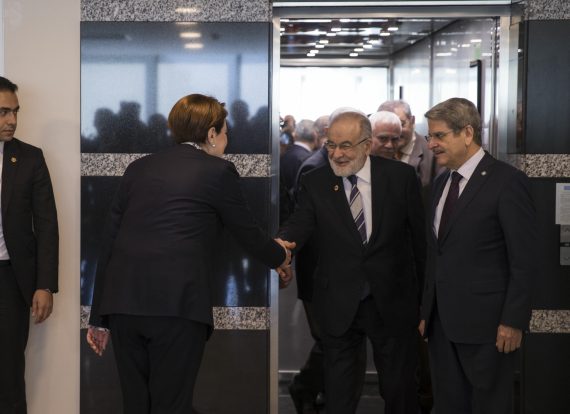The initial outcomes of the ongoing negotiations on pre-electoral alliance between the Felicity Party and the Iyi Party was revealed last weak. The vice chairman of the Iyi Party announced that both parties had agreed on forming an alliance on principal and that the Democrat Party will also join this alliance. As stated in the declaration coming from the Iyi Party, the content and method of this alliance is not clearly defined yet. Nonetheless, it is certain that these parties are going to form an alliance in the second run of the presidential elections if no candidate wins a simple majority (50%+1 vote) in the first round. The vice chairman of the Iyi Party rationalized this strategy by giving the example of Ekmeleddin Ihsanoglu who was nominated as the candidate for presidency by the CHP and MHP alliance in the 2014 presidential elections. The failure of Ekmeleddin Ihsanoglu in that election was taken as a reference point by the Felicity Party and Iyi Party to failure of pre-electoral alliance in the first round. Thus, the first significant strategy for these parties in forming an alliance appeared as the second run-based formulation.
Issues, principles or ideology?
Another striking point of this unripe alliance is the emphasis on ambiguous principals which are not publicly declared. Both parties explained that this alliance is going to be established on principals that both parties agreed on. Nevertheless, the extent and limitations of these principles were not defined. Whether the core of these principles are going to be a set of values or an ideology was not expressed by the parties. On the contrary, the AK Party-MHP alliance introduced the core of their alliance as the value of national unity, which would be open to each party respectful of the country’s national values, unity and solidarity. The AK Party and MHP also emphasized that parties willing to join this alliance had to respect these values. When it comes to the Iyi Party-Felicity Party-Democrat Party alliance, there is still no issue, principle, or value on surface in terms of forming the alliance. Because of this reason, the alliance has been criticized by some circles as being so latent.
Recommended
In this point, another striking question comes to the forefront: why have these parties accelerated their efforts to form an alliance even when they are not ready yet? Actually, it is obvious that the clear-cut formulation of the AK Party-MHP alliance forced other parties in the system to take their positions about forming an alliance. Even if these parties are not ready to form an alliance in related to the ambiguity of their interests, they took measures to not drop out of the race towards the 2019 elections.
Indeed, it is possible to have a discussion on the issue of ideological proximity between these parties in the following days. It is related to the fact that the ideological proximity between the parties to form an alliance will be effective in determining the components of the alliance and its success or failure. Since there is a mismatch between the ideologies of the Iyi Party-Felicity Party-Democrat Party triumvirate, it will be difficult especially in parliamentary elections for these parties to form alliances and hold their voters. Additionally, the CHP is expected to continue its search for alliance until the elections, which will also determine the boundaries of the Iyi Party-Felicity Party-Democrat Party alliance.
It is obvious that the opposition parties still lack in a consensus on pre-electoral alliances. The problems are mostly related to the problem of ideological distance between aforementioned parties and the fuzziness of their interests in joining an alliance.





